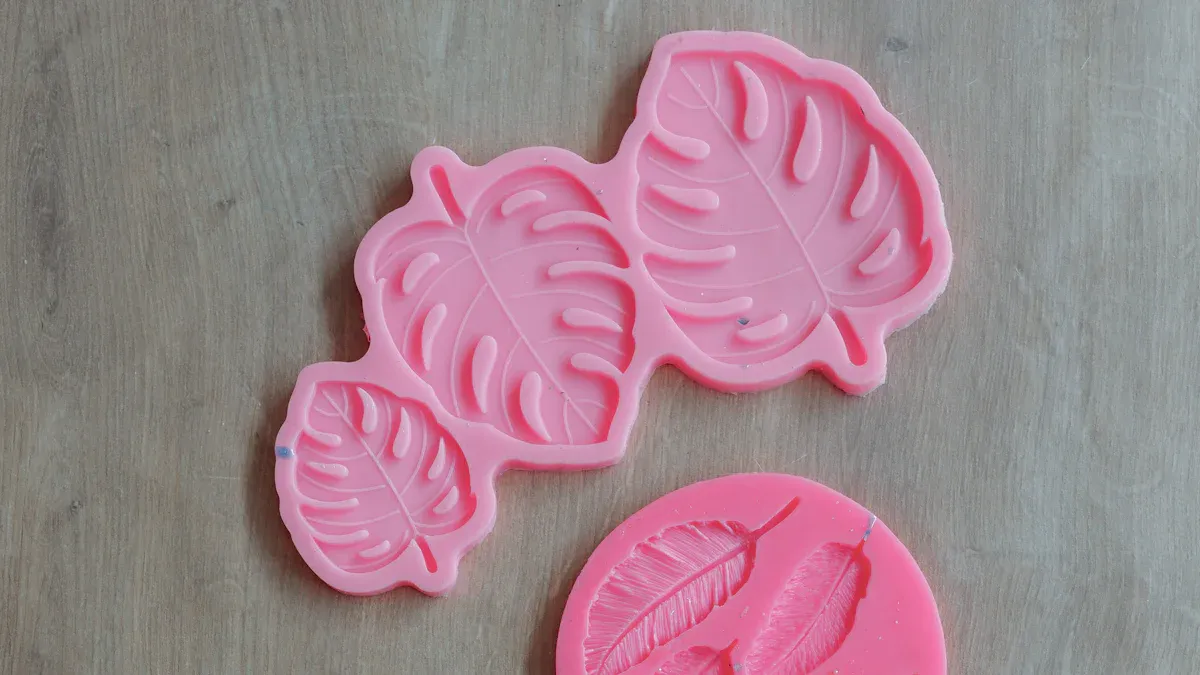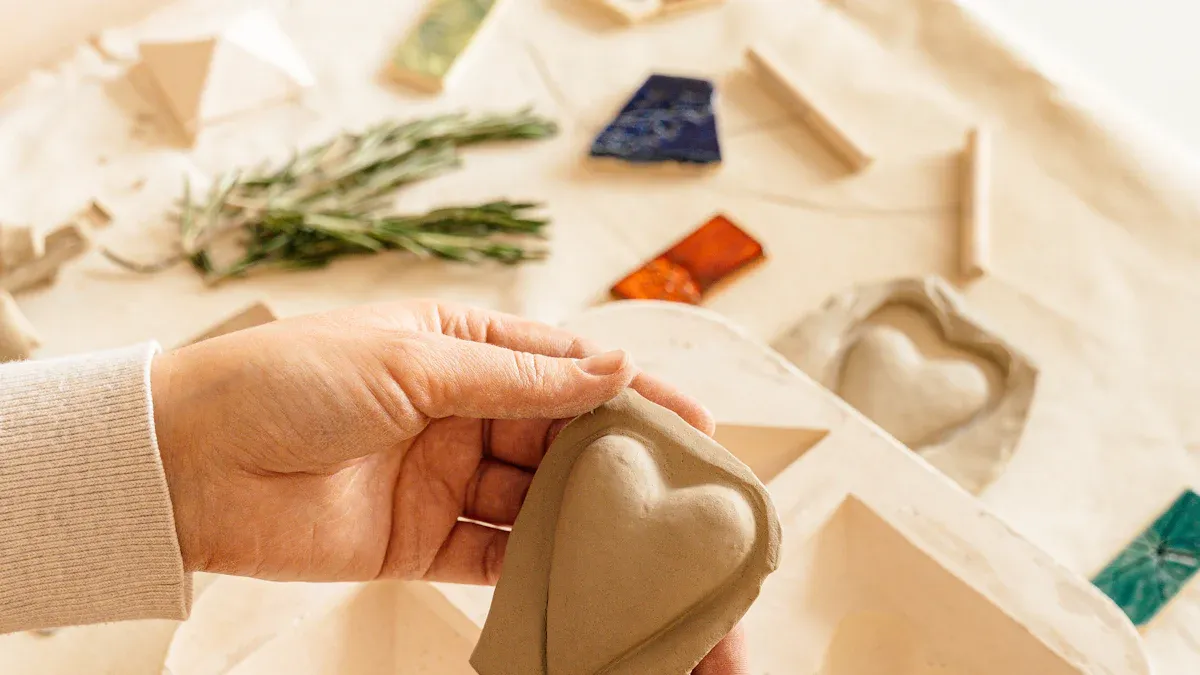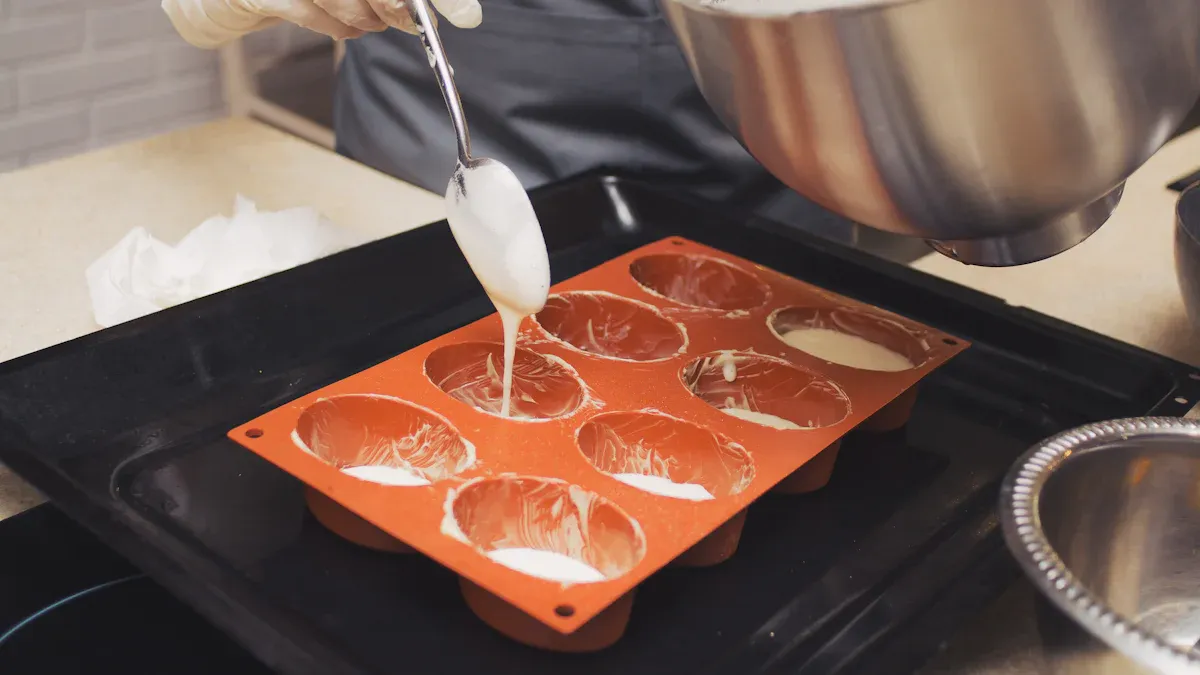
Custom silicone molds are revolutionizing the way medical-grade rubber products are manufactured in 2025. You can see their impact in how they enable precise designs and consistent quality for critical devices like surgical tools and implants. With advanced techniques like 3D printing and injection molding, these molds empower you to create complex geometries that meet the growing demands of modern healthcare. Additionally, the rise of smart materials that adapt to patient needs highlights how essential these molds have become for innovation in medical technology.

Custom silicone molds allow you to create intricate designs for medical devices with unmatched precision. These molds are essential for producing components like catheters, implants, and surgical tools that require exact dimensions and complex geometries. Advanced mold manufacturing technology ensures that every detail of your design is accurately replicated. This level of precision is critical when working with devices that must fit seamlessly into the human body or interact with other medical equipment.
For example, dimensional verification ensures that each product meets the exact specifications provided by your clients. By using precision measuring tools, you can confirm that every mold delivers consistent results. Additionally, in-process inspections monitor quality during production, ensuring that material properties and dimensions remain within strict tolerances. These practices not only improve the functionality of medical devices but also enhance patient safety.
| Measurement/Indicator | Description |
|---|---|
| Dimensional Verification | Use of precision measuring tools to ensure products meet exact dimensions specified by clients. |
| In-Process Inspection | Monitoring quality and consistency during production, including dimensions and material properties. |
| Final Inspection | Comprehensive checks on each batch to ensure functionality, appearance, and performance. |
Custom silicone molds play a vital role in maintaining uniformity across all your products. Consistency is especially important in the medical field, where even minor variations can impact device performance. By implementing strict quality control measures, you can ensure that every product meets the highest standards.
Key metrics like calibrated equipment checks and process deviation monitoring help you detect and address potential issues early. For instance, sensors can identify temperature drifts or pressure drops during production, preventing defects before they occur. Visual inspections and dimensional measurements further confirm that each part meets strict tolerance requirements. These steps ensure that your products not only look identical but also perform reliably.
| Quality Control Metric | Description |
|---|---|
| Calibrate Equipment | Regular checks on molding machines, ovens, and measurement tools to ensure accuracy. |
| Monitor Process Deviations | Use of sensors to detect anomalies like temperature drifts or pressure drops. |
| Visual Inspections | Checking for surface flaws, color inconsistencies, or foreign particles. |
| Dimensional Measurements | Confirming parts meet strict tolerance requirements using calibrated gauges or CMMs. |
| Functional Tests | Assessing mechanical properties such as tensile strength and elongation. |
By leveraging these quality control practices, you can achieve enhanced product consistency and meet industry standards like ISO 13485. This not only builds trust with your clients but also ensures that your medical devices perform as intended every time.
Custom silicone molds streamline production processes, enabling you to meet tight deadlines without compromising quality. Rapid tooling techniques allow you to produce parts within 24-48 hours for simpler designs, compared to traditional methods that often take weeks. This accelerated timeline significantly shortens the product development cycle, helping you bring new medical devices to market faster.
Additive manufacturing further enhances efficiency by eliminating the need for traditional molds. Building products layer by layer reduces setup time and simplifies the production process. This approach ensures quicker turnaround times, allowing you to adapt swiftly to changing customer demands. Faster production cycles not only improve operational efficiency but also give you a competitive edge in the medical manufacturing industry.
Custom silicone molds optimize material usage, helping you minimize waste and reduce production expenses. By refining mold designs, you can cut down on excess material, lowering raw material costs by up to 10%. Improved quality control processes also reduce the rate of defective products, saving both material and labor costs. Recycling scrap silicone further enhances sustainability while lowering expenses.
Liquid silicone’s durability and flexibility contribute to cost-effectiveness. Its precision in mold-making ensures higher-quality products, reducing the need for costly rework. On-demand production adds another layer of efficiency, allowing you to manufacture only what is needed. This flexibility minimizes storage costs and reduces risks associated with overproduction.
By implementing these strategies, you can achieve a more sustainable and cost-efficient production process, ensuring your operations remain competitive in 2025.
Custom silicone molds meet the rigorous standards set by regulatory bodies like the FDA and ISO, ensuring their safety and reliability for medical applications. These molds undergo extensive testing to comply with medical device regulations, which prioritize patient safety and product efficacy. By adhering to these benchmarks, you can confidently produce devices that meet global standards.
| Regulatory Body | Standard/Benchmark | Description |
|---|---|---|
| FDA | Medical Device Regulations | Ensures safety and efficacy of medical silicone products through rigorous testing. |
| EMA | Medical Device Regulations | Similar to FDA, mandates testing for biocompatibility and performance. |
| ISO 10993 | Biological Safety Testing | A series of tests assessing the biological safety of medical devices, including silicone molds. |
Suppliers of custom silicone molds also follow strict guidelines to maintain compliance. For example:
- The silicone material complies with FDA regulations for medical devices, ensuring safety for prolonged body contact.
- ISO 9001:2015 certification guarantees consistent production quality and minimal batch variations.
- Medical molding requirements focus on material selection and process control to ensure safety and effectiveness.
- Annual calibration of equipment to ISO/IEC 17025 standards ensures precision in inspections and tests.
These practices not only help you meet regulatory requirements but also build trust with clients and end-users.
Biocompatibility is a critical factor in medical manufacturing. Custom silicone molds are designed to meet ISO 10993 standards, which assess the biological safety of medical devices. This ensures that the materials used in your products are safe for direct or prolonged contact with the human body. By using biocompatible silicone, you can reduce the risk of adverse reactions and improve patient outcomes.
Cleanroom manufacturing further enhances compliance. Producing silicone molds in controlled environments minimizes contamination risks, ensuring the highest levels of hygiene. Cleanrooms maintain strict control over factors like air quality, temperature, and humidity. This level of precision is essential for creating medical devices that meet the stringent standards of 2025.
Tip: Partnering with suppliers who prioritize biocompatibility and cleanroom manufacturing can help you maintain compliance and deliver superior-quality products.
By focusing on these aspects, you can ensure that your medical devices not only meet but exceed industry expectations.

Custom silicone molds are transforming the way you approach medical innovation. Their adaptability allows you to create solutions tailored to the unique challenges of emerging medical technologies. For instance, one groundbreaking application involves the development of an articulating cement spacer. This device, used to treat periprosthetic joint infections, showcases how silicone molds can address specific medical needs with precision and reliability.
The versatility of silicone rubber further supports innovation. Its use in medical devices and implants demonstrates its ability to adapt to various applications. Whether you are designing intricate surgical tools or biocompatible implants, silicone molds provide the flexibility needed to meet evolving healthcare demands. With the increasing need for customized solutions in the medical field, these molds empower you to stay ahead of industry trends.
Did you know? 3D printing technology enhances the customization of silicone components, enabling you to design and produce parts that meet exact specifications. This capability is crucial as the demand for tailored medical devices continues to grow.
Rapid prototyping with custom silicone molds accelerates your product development process. Techniques like vacuum casting allow you to produce low-volume parts with exceptional detail and accuracy. This method is particularly effective for creating prototypes with complex geometries or overhanging features, which traditional molding methods often struggle to achieve.
Silicone molds also offer exceptional mold fidelity, ensuring that your prototypes closely match the final product. You can quickly create prototypes for visual evaluation and functional testing, reducing the time it takes to bring new medical devices to market. For example, silicone prostheses made using advanced molding techniques exhibit superior tensile strength and tear resistance. These properties ensure that your prototypes meet the rigorous demands of medical applications.
By leveraging these advancements, you can streamline your development process and deliver innovative solutions faster. Rapid prototyping not only saves time but also helps you refine your designs to meet the highest standards of quality and performance.
Custom silicone molds offer exceptional durability, making them a cost-effective choice for long-term use in medical manufacturing. Liquid silicone rubber (LSR), known for its flexibility and strength, ensures that molds can withstand repeated use without losing their shape or functionality. This durability is especially important when producing large quantities of identical medical components, as it reduces the need for frequent replacements.
Extensive testing confirms the reusability of silicone molds in demanding medical applications. For example:
| Test Type | Purpose |
|---|---|
| Biocompatibility Testing | Ensures the silicone does not cause irritation, toxicity, or immune reactions. |
| Chemical Resistance Tests | Confirms that silicone remains stable when exposed to cleaning agents, medications, and bodily fluids. |
| Durability & Temperature Tests | Evaluates how medical silicone components withstand heat, pressure, and long-term use. |
| Sterilization Compatibility | Checks whether silicone can endure autoclaving, radiation, and chemical disinfection without degradation. |
These tests demonstrate that silicone molds maintain their integrity even under harsh conditions, such as exposure to high temperatures or repeated sterilization. By investing in durable molds, you can reduce waste and improve operational efficiency.
The long lifespan of custom silicone molds translates to lower maintenance and replacement costs. Unlike traditional molds, which may require frequent repairs, silicone molds are designed to resist wear and tear. This resilience minimizes downtime and ensures uninterrupted production, saving you both time and money.
Although the initial investment in injection molding may seem high, it becomes highly cost-effective over time. Faster cycle times and reduced labor costs per unit contribute to significant savings. Additionally, economies of scale allow you to lower the cost per unit as production volumes increase. For high-volume manufacturing, this approach ensures that your operations remain profitable while maintaining product quality.
Liquid silicone rubber also offers biocompatibility and hypoallergenic properties, making it ideal for medical applications. Its ability to produce consistent, high-quality parts further reduces the need for costly rework or replacements. By choosing silicone molds, you can achieve long-term savings while meeting the rigorous demands of the medical industry.
Tip: Regularly calibrating your equipment and conducting quality assurance tests can further extend the lifespan of your molds and enhance their performance.
Custom silicone molds are reshaping medical manufacturing by meeting the industry's most demanding requirements. They deliver precision, efficiency, and compliance, ensuring your products meet global standards. Their adaptability supports innovation, enabling you to create advanced medical devices, diagnostics, implants, and surgical instruments.
| Application Area | Key Demands |
|---|---|
| Medical Devices | Precision, material integrity, compliance standards |
| Diagnostics | Biocompatibility, chemical resistance |
| Implants | Durability, flexibility |
| Surgical Instruments | High temperature resistance, low shrinkage |
By investing in custom silicone molds, you gain a competitive edge in 2025. Their long-term cost savings and ability to meet evolving healthcare needs make them an indispensable tool for your success.
Custom silicone molds offer greater precision and flexibility. They allow you to create complex designs and ensure consistent quality. Unlike traditional molds, they are durable, reusable, and compatible with advanced manufacturing techniques like 3D printing. This makes them ideal for medical applications requiring high accuracy.
Yes, custom silicone molds meet strict safety standards like FDA and ISO regulations. They use biocompatible materials that are safe for prolonged contact with the human body. Cleanroom manufacturing ensures hygiene, reducing contamination risks. These features make them reliable for producing medical devices and implants.
Custom silicone molds minimize material waste by optimizing designs. They also reduce defects through strict quality control, saving you money on rework. Their durability lowers replacement expenses, and faster production cycles cut labor costs. These factors make them a cost-effective choice for long-term manufacturing.
Absolutely! Custom silicone molds excel at creating intricate geometries. Advanced techniques like injection molding and 3D printing ensure precise replication of complex designs. Whether you need surgical tools, implants, or diagnostic devices, these molds provide the flexibility and accuracy required for modern medical technology.
Custom silicone molds promote sustainability by reducing material waste and enabling recycling of scrap silicone. Their durability ensures long-term use, lowering the need for frequent replacements. Additionally, efficient production processes reduce energy consumption, making them an eco-friendly choice for medical manufacturing.
Tip: Partner with suppliers who prioritize sustainable practices to further enhance your environmental impact.